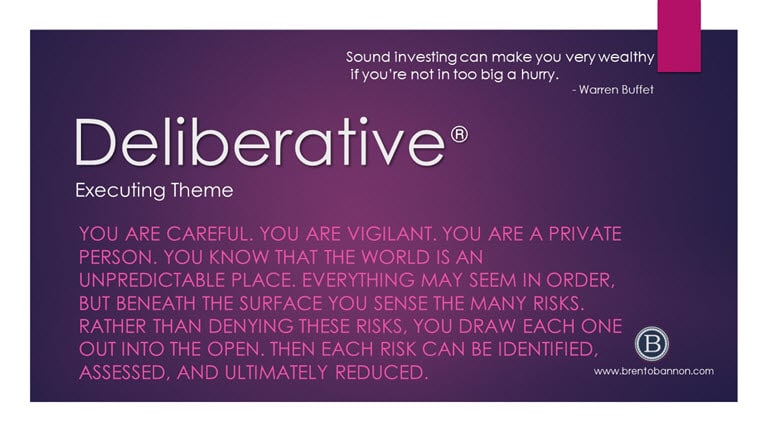
Are you a fairly serious person? Do you plan ahead to anticipate what might go wrong? When it comes to making decisions do you believe making the correct decision is always better than making a quick decision? Then you may have the CliftonStrengths® theme Deliberative®.
People with the Deliberative strength are practical and do not think in abstracts, but in concrete, practical terms. Famed investor Warren Buffett is the poster child for Deliberative thinking. Buffett is an American business magnate, investor, speaker and philanthropist who serves as the chairman and CEO of Berkshire Hathaway. He is considered one of the most successful investors in the world and has a net worth of US $89.9 billion as of May 4, 2019, making him the third-wealthiest person in the world.
By all accounts, Buffet is a patient man, down to earth, his reasoning sound. He’s inclined to trust his own judgement when it comes to investing stock in the face of fake news, organizational cover-ups, undisclosed security and data breaches, and wide-scale deceit like Wells Fargo’s creation of millions of fraudulent savings and checking accounts for customers without their consent.
In the cutthroat world of stock investing, how is it that Buffett, a man known for his honesty and transparency, has succeeded?
The answer might be that Deliberative people are vigilant—your brains pick up on small details that others miss and, based on this data, you avoid the missteps others unknowingly fall victim to. According to Buffet, the difference between the average Joe and himself is he gets up every day and has a chance to do what he loves to do. The road to wealth sounds almost too easy, but Buffett is earnest. He loves what he does. He genuinely believes his success is a result of playing to his strengths.
The question is, why don’t more of us do the same? Why don’t we consciously use our strengths in our daily decisions?
What makes Buffett unique is that he put his strengths to work. First, he became aware that he had special talents. Second, he identified the strongest of those talents, added a dose of education and experience, and built these strengths into a business.
Deliberatives, such as Buffet and you, ponder decisions. Once a decision is made, you don’t second guess yourself, and instead double check that people follow through. Buffet turned his natural patience into a long-term vision of investing. For instance, he invests only in companies whose trajectory he can forecast with some level of confidence for the next twenty years or more. Companies like Dairy Queen, The Coca-Cola Company, and The Washington Post Company—and yes, even Wells Fargo.
Deliberatives do not often give praise. Instead, you focus on potential risks, problems, and dangers in relationships, at work, and in the world. It’s the Deliberatives’ job to find the hidden mines. You thrive at decreasing risks that may harm your business, workplace, or team.
A result of continuously scanning the world for potential pitfalls is that you are often (wrongly) seen as naysayers. When you perceive danger, you try to warn the group and encourage others to make wise decisions. You naturally help others avoid the pitfalls that could sabotage success. When others recognize your talent, you will be sought as a valuable sounding board.
So how do you turn Deliberative into cash? First, you sweat an idea, and then you go fast and far with each idea.
Say you are an executive coach and your objective is to land three new clients willing to commit to personal one-on-one coaching for twelve months or longer at a fee of $8,000 per month or $96,000 for the year. Sign up all three and you add nearly $300,000 to your existing income.
Your idea is to approach mid-level executives looking for a promotion or a position at another company if it means senior-level authority and a pay increase. First, you appraise the idea. You stop, listen, and assess. It’s way too soon for action.
You have good judgment and a tendency to see through people’s behaviors, so look for opportunities to help others think through their decisions before they act too quickly. Mid-level executives are often reluctant to ask for help, especially from others within their firm. In a way, aren’t all mid-level execs fighting for the same promotion, and thus less likely to help one another? Here is your opportunity. This is your pitch: Work with me precisely because I’m not part of your organization, and we will create a strategy for your success.
Next, you see problems as opportunities. There’s no doubt your new coaching client will list dozens, maybe hundreds of reasons a promotion to a top position is unattainable. Each of these reasons—the company is downsizing, my division isn’t as profitable as others, I don’t get along with my current boss, other executives have greater tenure, several attended an Ivy League university, and so on—are in fact an opportunity for you as a coach to work your magic, to turn this argument on its head and mentor your client in alternate ways of thinking.
As a Deliberative, you see the advantage of being conservative in your decision-making. Next, you must convince your client to do the same, to think long-term, to create a plan for success, and methodically work the plan. As an executive coach, your job isn’t to show your client how to weasel their way into a promotion, but to learn to think and act like a senior executive, and to exude these characteristics in their daily operations.
Are you like Warren Buffett putting your unique strengths to work? What special talents do you possess? Once you identify your strongest of those talents, how can you add education and experience to build your strengths into a business you love? Please share your comments below.
Not sure where you are and need some conversation around your unique strengths or building your business? Remember you can schedule your Ask Brent Anything call. Let’s talk about strengths.





